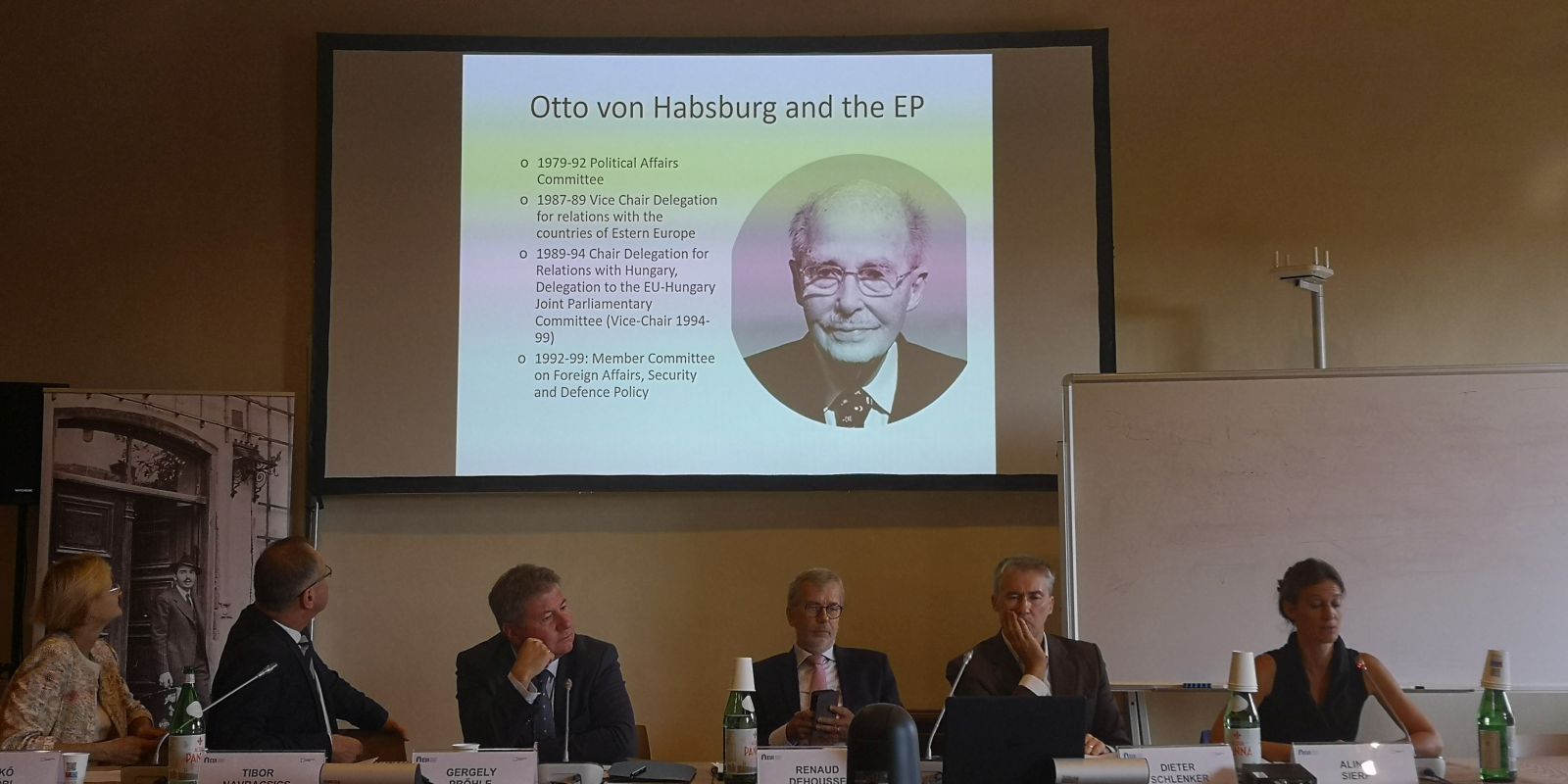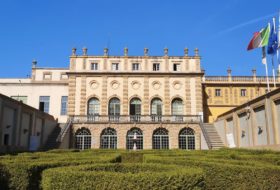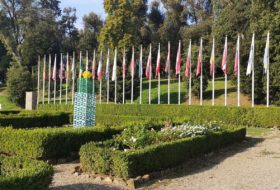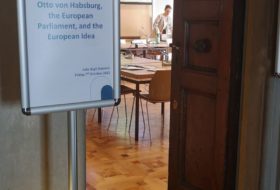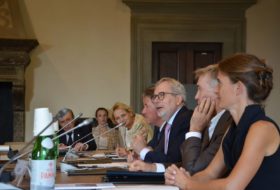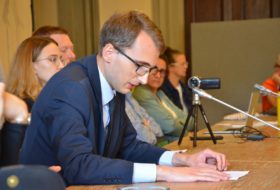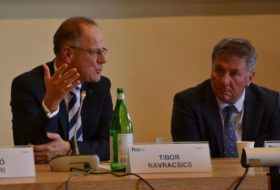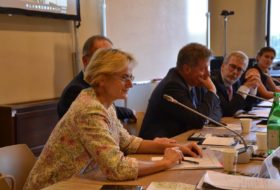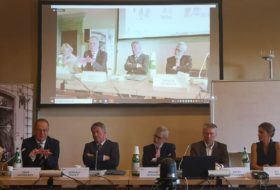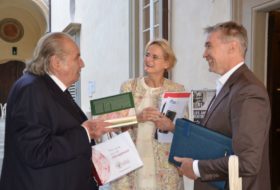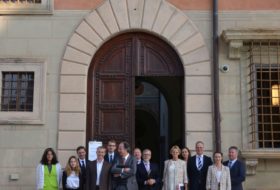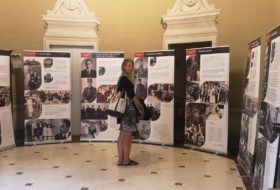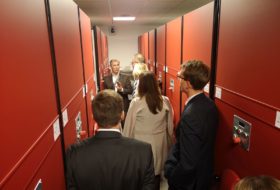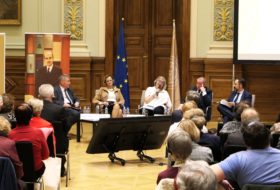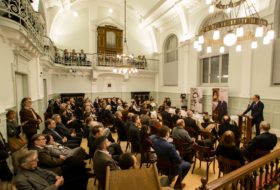The Historical Archives of the European Union, which brought our Foundation into contact with the EUI, is a valuable part of the Institute with the aim of preserving, among others, the archival holdings of the EU institutions. In his welcome address, Dieter Schlenker, Director of the Archives, recalled the previous visit of the delegation of the Otto von Habsburg Foundation last spring, which, in addition to bringing the idea of the current conference to the table, paved the way for future possible ways of cooperation. He stressed that although Otto von Habsburg’s remarkable life and work may be less well known in Western Europe, his European commitment could link the Eastern and Western parts of the continent. He reminded the audience that Otto von Habsburg served four legislative terms as a Member of the European Parliament (MEP), and that the material heritage of his work, i.e., his speeches and other parliamentary materials, is preserved in the Florentine archives and could provide additional intriguing insights into the history of the European Union and the concept of European cooperation.
In his opening remarks, Professor Renaud Dehousse, President of the EUI, explained that one of the aims of the Institute, according to its founding treaty, was to bring together the entire European continent, which was then divided by the Iron Curtain, in the field of science. In this way, the core mission of the Institute resonates well with Otto von Habsburg’s vision of a united and free Europe. Hence, conferences like this one can help to identify “how to draw inspiration from what has been done by persons of such a calibre and how we, at our modest level, may stay faithful to their heritage.”
In his opening speech, Gergely Prőhle, Director of the Otto von Habsburg Foundation, emphasised that the work of the last heir to the Hungarian throne and later MEP was characterised not by frustration over the loss of power, but rather by gratitude for everything he was granted during his political career. This optimism is also expressed in the conference’s title and can inspire us on the 110th anniversary of his birth. Two of the most important messages of Otto von Habsburg’s legacy—his deep Christian faith and his ability to reconcile modernity with national and European interests—should also be seen in the light of this optimism.
A scholarly analysis of Otto von Habsburg’s activities in the European Parliament (EP) was carried out and presented at the conference by Aline Sierp, Associate Professor at Maastricht University. She explained that out of Otto von Habsburg’s numerous speeches and motions, those relating to the process of regime change, the transformation of Central and Eastern Europe (including the collapse of the Soviet Union and Yugoslavia), the unification of the two German states, and the enlargement of the European Union are of particular interest. A closer examination not only shows the significant role Otto von Habsburg played in shaping these processes but also highlights the increasingly active involvement of the EP in foreign policy matters. Despite this active engagement, Otto von Habsburg was aware that reactions to the transformation processes in the former Eastern bloc had to be treated with caution, as they could have unintended consequences that might negatively influence the political realignments there. Assessing the twenty years of Otto von Habsburg’s parliamentary work, who held a seat in the European People’s Party group with the mandate of the Bavarian Christian Social Union but enjoyed cross-party appreciation, the lecturer concluded: “Thank God that he was a member of the European Parliament.”
In his previously delivered speech dealing with Otto von Habsburg’s role in forging the European idea, former French Minister for European Affairs, Alain Lamassoure, pointed out that although his late colleague was aware of the shortcomings of the European integration process, and in particular of the Maastricht Treaty, this critical stance did not mean that he rejected the creation of common European institutions. Instead, he fully supported them despite their shortcomings. The French politician emphasised that due to his centuries-long dynastic experience, Otto von Habsburg had contributed a lot to making Europe into an integration that does not abolish the lower levels of sovereignty (state, region, and municipality), but accepts them. In his address, he also pointed out that at a time when public opinion was celebrating Fukuyama’s vision of history, Otto von Habsburg had warned his colleagues against excessive optimism, drawing attention to the risks of migratory pressures, a resurgence of pandemics, or environmental degradation. He also recognised the need for a collective European foreign and security policy in the light of potential threats of war coming from outside. “Never were Otto von Habsburg’s lessons more relevant for understanding our time and coping with all its challenges”—he concluded.
Enikő Győri, Member of the European Parliament, recalled that in the 1990s she had the opportunity to meet Otto von Habsburg personally in the committees preparing the Association Agreements between the European Union and Hungary. At the beginning of her talk, she encouraged us to consider Otto von Habsburg’s suggestion that what divides us Europeans is much less important than what unites us. Referring to the historical introduction by Aline Sierp, Enikő Győri pointed out that the role of the EP has changed considerably in recent times, which also means that it now claims a say in more and more issues that do not fall within its competence. Regarding current developments, she noted that debates in the EP are becoming increasingly polarised, as evidenced by the discussion of the main issues that have particularly preoccupied the Parliament recently (e.g. the right of legislative initiative, the system of top candidates and environmental issues). However, this new context also raises the issue of accountability, as it is unclear who is responsible for the consequences of decisions where Parliament exceeds its mandate. Having said that, she added that Otto von Habsburg “would still be very proud, but quite worried whether the present European Parliament is really working for the sake of the European citizens and whether it is really improving the European Union that would serve better the Europeans.” With a view to current developments, “I am definitely concerned”, concluded MEP Győri her speech.
Tibor Navracsics, former EU Commissioner and current Minister for Regional Development, spoke about the European tradition of the subsidiarity principle and its relevance today. He briefly described the concept, which goes back to the social teachings of the Catholic Church, and was incorporated into the legal framework of the European Union with the Maastricht Treaty, and has since become a cornerstone of the integration process. According to the Minister, the popularity of the concept is due to its ambiguity, and it is precisely this nature of the concept that has allowed the European Union to function efficiently over the last thirty years. He pointed out that Otto von Habsburg’s personal experiences and political socialisation, as well as his insights from the history of the Habsburg Empire, enabled him to recognise ways in which subsidiarity could work in practice. On the basis of these insights, Otto von Habsburg also believed that the specific historical lessons of the former Habsburg Monarchy could serve as an example for the European Union. The everyday practice of “common sense subsidiarity,” which can be created through the “mutual benevolence and cooperation of the constituent parts of society,” is one of the most important achievements of this specific Central European experience. Otto von Habsburg’s legacy made it clear that Europe should be an integration that recognises national, regional, and local sovereignties based on different historical experiences and to achieve a greater common good. In concluding his address, Minister Navracsics stressed that the future of the European Union must be based on trust in common-sense solutions, avoiding ideological debates and focusing on practical solutions for living together in Europe.
The meeting was followed by the opening of an exhibition on the life of Otto von Habsburg, entitled “Life and Heritage”, in the foyer of Villa Salviati.
